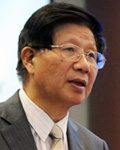| At the Sixth Beijing Forum on Human Rights, participants exchanged their views on issues pertaining to the development and protection of human rights. The following are edited excerpts of papers submitted by attending scholars.
 |
|
Li Junru, Vice President of the China Society for Human Rights Studies and former Vice President of the Party School of the Central Committee of Communist Party of China (CPC) | The concept of the Chinese Dream not only represents a dream of national rejuvenation and prosperity as well as the people's wellbeing, which has been pursued from generation to generation in China, but is also a dream of human rights for which Chinese people have long strived.
The rights to subsistence and development are principal human rights, and this is also the Chinese people's view of human rights. On one hand, this is because we have realized that humans can commit themselves to politics, science, art, philosophy, religion, and other activities only when their needs for food, drink, housing and clothing are properly met. This means that the rights to subsistence and development are prerequisite for effective implementation of other human rights.
On the other hand, after lagging behind Western countries in terms of economic and social development for so many years, China is finally able to combat poverty and underdevelopment only when its rights to subsistence and development are fulfilled. It has been proven that poverty and insufficient development are the biggest obstacles in preventing Chinese people from fully enjoying their human rights.
Treating the rights to subsistence and development as principal human rights meets the requirements of human rights development and the best interests of the Chinese people and it is also the inevitable choice in protecting and promoting human rights in China.
China's view of human rights has become the norm for all developing countries around the world, as well as the international community. The UN Declaration on the Right to Development defines the right to development as "an inalienable human right by virtue of which every human person and all peoples are entitled to participate in, contribute to, and enjoy economic, social, cultural and political development, in which all human rights and fundamental freedoms can be fully realized."
The Vienna Declaration and Program of Action also points out that "the existence of widespread extreme poverty inhibits the full and effective enjoyment of human rights; its immediate alleviation and eventual elimination must remain a high priority for the international community."
We persist in holding that the rights to subsistence and development are the principal human rights in the hope of mobilizing the people to concentrate on social improvement and economic development and realize the Chinese Dream of national rejuvenation.
 |
|
Tom Zwart, Professor of Human Rights, Utrecht University and Director of the Netherlands School of Human Rights Research | Despite good intentions and sincere efforts on both sides, discussions on human rights between Northern developed countries and Southern developing countries do not seem very fruitful. This is exemplified by the human rights dialogues that take place between China and its Northern partners. Although these sessions are conducted behind closed doors, the glimpses we get as outsiders do not paint a very positive picture. The meetings have become antagonistic and at times even testy. If these encounters have any effect at all, it is driving the participants apart rather than bringing them together.
The human rights debate is currently being dominated by views that are popular in the North, while there is only limited attention for indigenous practices and perceptions in other parts of the world. The reasons why Southern views on human rights currently receive little attention from the participants in the international human rights discourse are twofold.
On the one hand, this is because the zeal with which Northern actors promote their views on human rights, and the resources available to them to make their case, are difficult to match. On the other hand, however, Southern modesty and humility also play a very important part. Experts from these regions are not culturally disposed to seek the limelight and to counter the criticism expressed by international experts. As a result, Northerners are not being exposed to a wealth of material on human rights that could assist them in getting a better understanding of the debates that are going on in the South.
In other words, not only do Northerners push for their views to be heard, their counterparts in Africa and Asia offer them the room to do so by not claiming their own territory and rebutting the criticism.
To counter this trend, Northerners should approach the human rights debate with more humility by accepting that other views are equally legitimate. To be able to do so, they will have to accommodate their cultural schemes when necessary.
Southern scholars can also make an important contribution. Northerners tend to define the South in terms of human rights because it does not do so vocally itself. Therefore, Southerners should feel encouraged to showcase their research more actively in international forums, in languages which are accessible to wider academic audiences.
| 